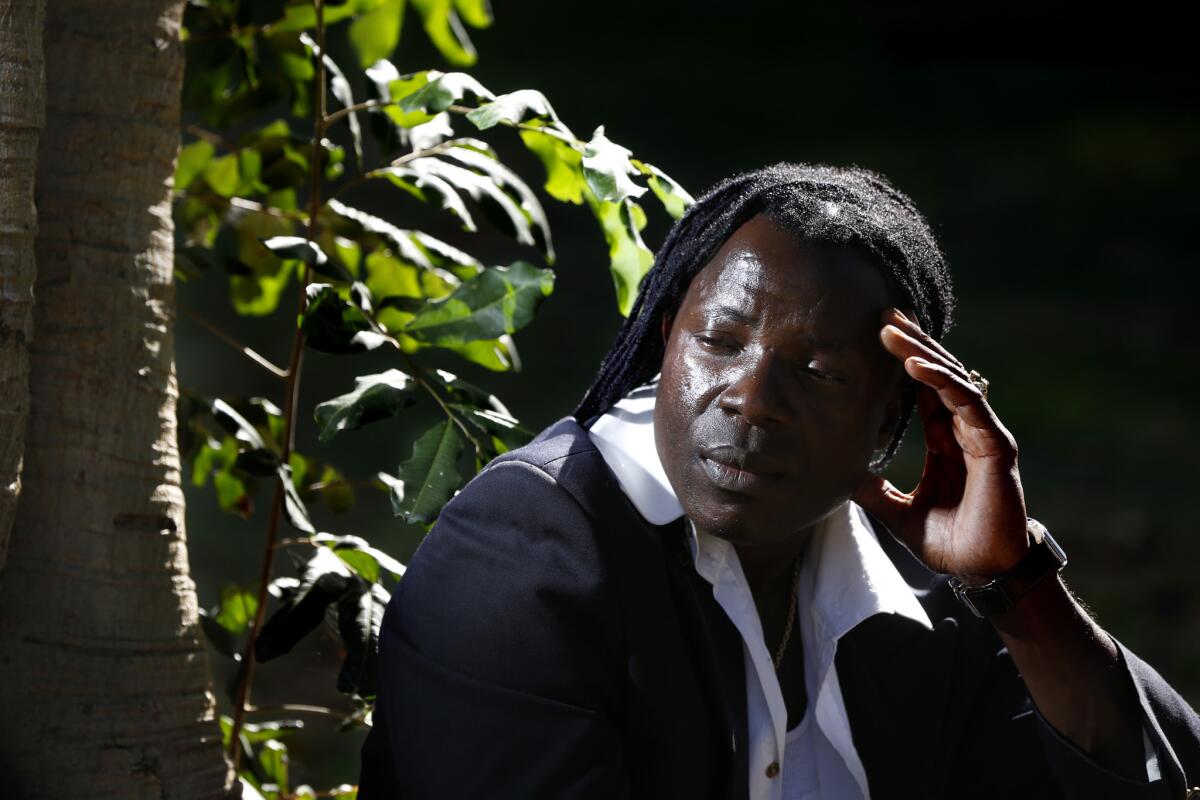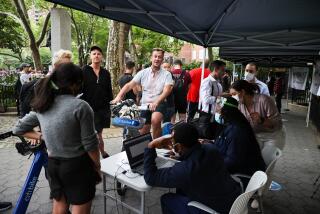Irrational Ebola fears make life difficult for Liberians in the U.S.

- Share via
Reuben Gobah considers himself a victim of Ebola — or at least of our hysteria over the disease.
He hasn’t set foot in Liberia for more than 15 years, but any connection to West Africa seems to be enough to make people want to steer clear.
“You can read between the lines,” said Gobah, a Liberian national who came to America in 1999 and lives in Buena Park. “There’s a lot of negative attitude toward me that I’ve never felt before.”
He’s lost clients in his fitness training practice. Friends he used to socialize with are suddenly too busy to visit. Even his girlfriend seems a little standoffish. “It’s really freaked me out,” Gobah told me.
Maybe he’s blaming the taint of Ebola for life’s random vagaries. But other Liberians living here share that same sense of unease, concerned that people may avoid them because of irrational fears about the deadly disease.
“The vast majority of people we encounter are sensible and very, very kind,” said Samuel L. Hoff, head of the Liberian American Community Organization of Southern California. “But there are always a few.... If they see the Liberian, they start to run.”
About 2,000 people from Liberia live in Southern California, he said. Many, including Gobah and Hoff, were driven from their country by a civil war that lasted more than a decade, decimated basic services, ruined Liberia’s economy and killed more than 250,000 people.
Hoff spent three years in a refugee camp in Sierra Leone before coming to Los Angeles as a teenager in 1993. “This is my home,” he said.
“Do I believe the American people are wonderful? Yes I do. When there’s a crisis in other countries, the people here come together and help,” he said.
But the hysteria attendant to the Ebola epidemic has not only stigmatized West Africans, he said; it’s stifled public support for efforts to raise money to help battle the disease.
“Ebola is being portrayed as a problem that has been bestowed on this nation by people from Africa,” Hoff said. “When that kind of message is out there, it’s hard to galvanize people to step up and help.”
Because they’re hunkering down in fear and panic instead.
::
I spoke to Hoff as he was driving a truckload of cargo containers packed with towels, bleach, body bags and medical supplies donated by Long Beach Memorial Medical Center, to be delivered to Liberia.
The donation was coordinated by local trauma surgeon Grace Dinkins, a native of Liberia, where Ebola has already killed more than 2,500. Thousands more have died in Guinea and Sierra Leone.
In this country of 300 million, three people have been diagnosed with Ebola. Yet we’re panicking now whenever someone sneezes or vomits or — heaven forbid — seems to be running a fever.
Two-thirds of Americans say they are worried about the possibility of an Ebola epidemic here. So it’s disappointing, but not surprising, that West Africans are bearing the brunt of outsized fears.
“I’ve been in America for all these years and people have been so good, so friendly,” Gobah said, as we chatted over coffee at his local Starbucks.
“For many of them, I’m the first African guy they know. Now they think: ‘You’re not clean. You’re not healthy. We can’t associate with you.’ It hurts. It doesn’t feel fair to me.”
I could hear the pain in his voice, as we walked across the parking lot. As I left, I reached out and shook his hand.
Then I chastised myself all the way home — wondering if I had been afraid to lean in and give the man a hug.
::
Gobah ended up in Virginia when he left a refugee camp in Africa’s Ivory Coast. He visited California for an athletic competition and fell in love with the people (so open-minded) and the weather (so much like his homeland).
He settled here and hustled his way toward success. He started a fitness training business, gave music lessons and promoted social events that focused, he said, on “peace and unity.”
Now he’s not feeling much of either peace or unity. The last two months have been inexplicably hard, he said.
He’d booked a room at a restaurant for a private party this month. An hour before it was to start, the restaurant owner canceled the event. “He says he isn’t comfortable with it,” Gobah said.
A client he’s been training five days a week for four years “is now always finding different excuses not to see me,” he said. Another declined to let Gobah in when he stopped by to be paid. “I have been training him at his house. But now he decides to put the check in the mailbox and told me to take it from there.”
And a man Gobah had considered one of his best friends is now avoiding him.
They were together in Gobah’s car recently when his friend’s cellphone rang. Gobah could hear the voice on the other end. “Someone was calling to remind him that I’m from Liberia. That he should be careful about people from Africa. That will prevent him getting Ebola.
“I was sitting there listening to the conversation. My whole body froze. My friend started shaking, panicking, screaming that he was getting sick.”
That was when Gobah began to believe that his nationality might matter more than the four marathons he’d run, the fitness classes he’d taught or the friendships he’d developed.
“That even though I’m not sick and have been in this country for many years, I am a victim of Ebola because that is what people see.”
The Liberian American Community Organization of Southern California is raising money to fight Ebola in Africa. Find out more at https://www.lacosc.org.
Twitter: @SandyBanksLAT
More to Read
Sign up for Essential California
The most important California stories and recommendations in your inbox every morning.
You may occasionally receive promotional content from the Los Angeles Times.











